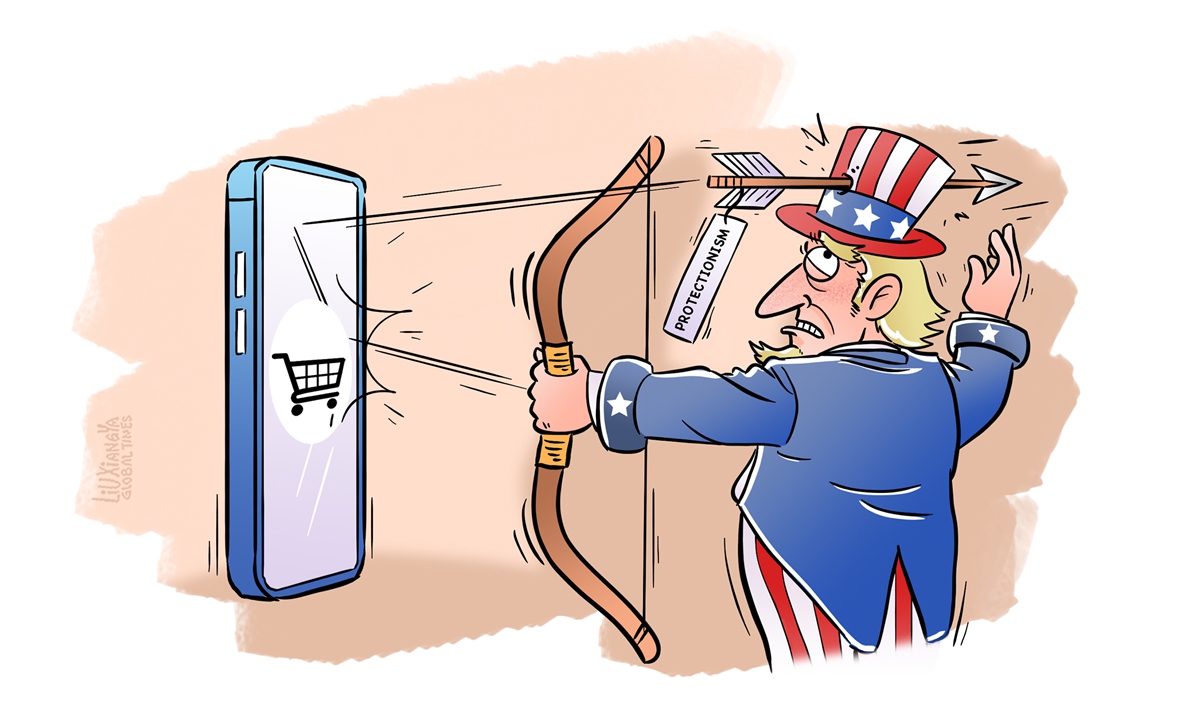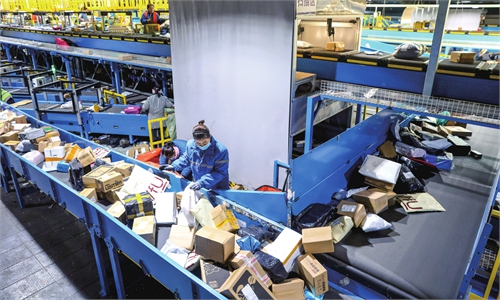
Illustration: Liu Xiangya/GT
White House officials announced on Friday their intention to propose restrictions on the use of the so-called de minimis exemption, which currently allows products valued at less than $800 to be shipped directly to US consumers without customs declarations or duties. The proposed curbs could create uncertainty for cross-border e-commerce giants from China and other countries, Bloomberg reported.From an objective perspective, if the US decides to impose restrictions on low-value packages entering the US market, this will affect cross-border e-commerce businesses from all countries exporting to the US market, as well as for those importing cross-border e-commerce parcels into the US.
The US government's proposed curbs reflect its focus on protecting domestic industries, particularly in the textile and apparel sectors, where US manufacturers are concerned about the impact of low-cost imported goods. However, it's indisputable that affordable and high-quality international products, especially those from China, have helped enhance the purchasing power of US consumers.
For products such as clothing and textiles involved in packages with declared values at less than $800, the cost performance of Chinese products is unmatched by those from other countries and regions. Therefore, a potential strong backlash from American consumers and US cross-border e-commerce importers poses a challenge to Washington as it continues to pursue this mutually detrimental protectionist policy.
For instance, US companies like Amazon and Walmart have long imported goods under the de minimis exemption. If the US cancels this exemption, the costs for these companies will undoubtedly increase, which will constrain their development and consequently have a negative impact on the US economy.
The National Foreign Trade Council - an American trade association whose members include international shippers FedEx, UPS and DHL, as well as retailers Amazon and Walmart - has defended the exception, arguing that it is "an essential component of America's economic health and supply chain efficiency." Without the exemption, costs would rise for American consumers and small businesses, the council says, according to the Associated Press.
Admittedly, if the US takes further steps in the wrong direction toward protectionism, it will impact China's cross-border e-commerce and certain industries, such as textiles, that provide cost-effective products for the US market. However, this negative impact should not be exaggerated.
The rapid development of some cross-border e-commerce and textile industries in China over the years - surpassing external expectations - has relied not only on international free trade rules but, more importantly, on the accelerated development of domestic digital transformation and the rapid upgrading of the manufacturing sector's inherent advantages. This is something that US protectionism cannot restrict.
The advantages supporting China's cross-border e-commerce also include new business models backed by a rapidly developing and robust digital economy. Chinese cross-border e-commerce can offer high-quality and customized products at competitive prices, largely due to innovation in business models rather than merely relying on relatively low labor costs and the benefits of free trade.
China's foreign trade is rapidly gaining advantages in terms of both digitalization and green transition. There are more than 120,000 cross-border e-commerce enterprises in China. In the past five years, the scale of China's cross-border e-commerce trade has increased by more than 10 times, according to media reports. These figures reveal robust momentum in the Chinese digital foreign trade sector.
Although some Western politicians are anxious about the rapid development of China's cross-border e-commerce and have even begun to irrationally advocate for a lose-lose approach through protectionism and tariffs, the only way to help American businesses and industries succeed in competition is to respect free trade rules, accelerate innovation, and embrace the trends of digitalization and green transition in global trade.
The proposed restrictions on the de minimis exemption not only jeopardize the viability of cross-border e-commerce but also risk harming the interests of American consumers and businesses that benefit from these channels. As the landscape of global trade evolves, it is essential for Washington policymakers to understand that protectionist measures ultimately undermine the broader economic interests of their own companies and consumers.
The author is a reporter with the Global Times. bizopinion@globaltimes.com.cn



